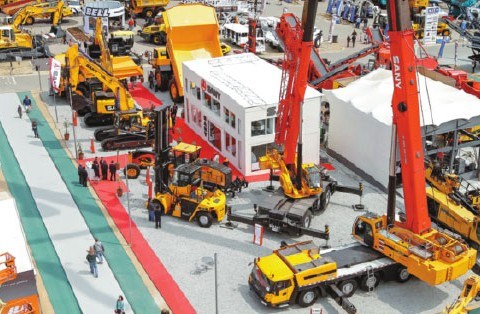

Sany's mining machines at a machinery exposition in 2013 in Johannesburg. Provided to China Daily
Machinery producer advocates long-term view for companies on the continent
Africa's industrialization and the multitude of infrastructure projects throughout the continent are giving Chinese heavy equipment manufacturer Sany Group Co Ltd huge scope to expand abroad.
However, Xiao Jiang, general manager of subsidiary Sany Southern Africa (Pty) Ltd, said that while Africa has tantalizing potential as a market, any Chinese company contemplating taking advantage of that potential needs to take a long-term view.
The African unit sells machinery used in building roads and mines, dredging harbors and lifting, among other functions. Last year, sales reached $250 million.
"If all you do is scramble for market share by offering the lowest price and don't care about related services, it's only a matter of time before your operations fold," Xiao said.
"Chinese companies in Africa need to remember that having a solid foundation and a long-term strategy is a must."
Penetrating a foreign market can be tough, particularly in the early stages, Xiao said, and Sany is concentrating on setting up a regional platform to complete the chain locally, so that it has a long-term future in Africa.
"In our industry, selling machinery is a primary-stage activity in a long industry chain. You can't just sell new machinery. You need to offer other services as well, such as spare parts support, after-sales service, maintenance, training, financing, rental and other related services."
Sany Group's domestic and overseas operations are independent of one another. It has 10 offices outside China.
The southern Africa unit is Sany's biggest in Africa, and it operates in 30 countries on the continent. It has five country-specific companies as well.
Zeng Hongbo, marketing director for Sany in South Africa, said its annual sales are more than twice the total for all its Chinese competitors in the country combined.
"Our sales totaled about $70 million last year, while the whole region's were more than $250 million, meaning we have maintained annual growth of more than 40 percent. In 2012, we had explosive growth thanks to mining in Ghana."
Sany entered Africa in 2002 when it started selling equipment to Chinese companies and other companies through local agents. Two years later, it decided to establish a physical presence in the continent.
"The number of staff stationed in Africa peaked at more than 400 in 2007, but we thought the way we were selling was inefficient and unsustainable, so in 2009 we overhauled the way we sell," said Zeng
Since then, Sany has set up 30 subsidiaries worldwide that offer ancillary services, and sales operations were overhauled to give agents a key role. Representative offices in various countries were supplanted by bigger regional offices.
Of Sany's original decision to enter Africa, Zeng said: "At the time, all the leading heavy equipment companies felt that the only way to survive in the long run was to go international."
In South Africa, about 90 percent of Sany's customers are local, Xiao said.
"But in other main markets such as Angola, Cameroon, Ghana and Tanzania, it's split between local companies and Chinese companies."
Sany's products have been proven in construction projects worldwide, he said, including the main stadium of the football World Cup in South Africa in 2010, a railway line linking Johannesburg and Pretoria, emergency work on the Fukushima nuclear power station in Japan and in a mining disaster in Chile.
Xiao said Sany's machinery has a price advantage over that of its competitors in Europe and that its prices are close to those of its Japanese competitors.
"But among other Chinese and South Korean heavy machinery makers, there is no doubt our products are more expensive. That's because of our outstanding competitive advantages."
In China, Sany has a research and development team of more than 6,000 engineers.
"We also have the largest manufacturing base and best machinery in China," Xiao said.
Opening a manufacturing plant in Africa is "unrealistic" right now, Xiao said, but an assembly plant is in the planning stages.
"We bought a site in Johannesburg" for the plant, he said, and a logistics and maintenance center will be built at the same location.
Local assembly will add a sharp competitive edge to Sany, and it expects to assemble its first excavator in South Africa this year, followed by cranes, road construction machinery and dredging equipment.
"When the maintenance center and assembly plant are completed, we will create more jobs for local workers and transfer skills to them," Xiao said.
"We are negotiating with local authorities, wanting to work with them to run certificate programs for local workers. We're not just selling machinery in Africa. We're also helping improve industrial skills."
Flip Hennop is the agent for Sany's cranes in South Africa. Two Sany cranes he sold on the company's behalf in 2008 helped win him over, and he became the company's agent in 2010.
"They helped us establish a sales network and service team, as well as the maintenance and spare parts center," he said.
Sany's cranes had one of the biggest market shares in South Africa last year, he said, and that share continues to grow.
Serge Levy, a new Sany agent, said the company's agent model works well. "We can talk with them about nearly everything in the market to ensure the channels are smooth and that products satisfy local needs." The quality of the system guarantees that his company makes money, he said.
Sany, Zoomlion both report slide in Q3
2013-11-01Sany denies claims of oversized debt
2013-06-14Sany seeks large and localized European presence
2013-05-26Sany to continue with lawsuit against Obama
2013-02-25Hunan govt tries to stop Sany relocation
2012-12-03Copyright ©1999-2018
Chinanews.com. All rights reserved.
Reproduction in whole or in part without permission is prohibited.